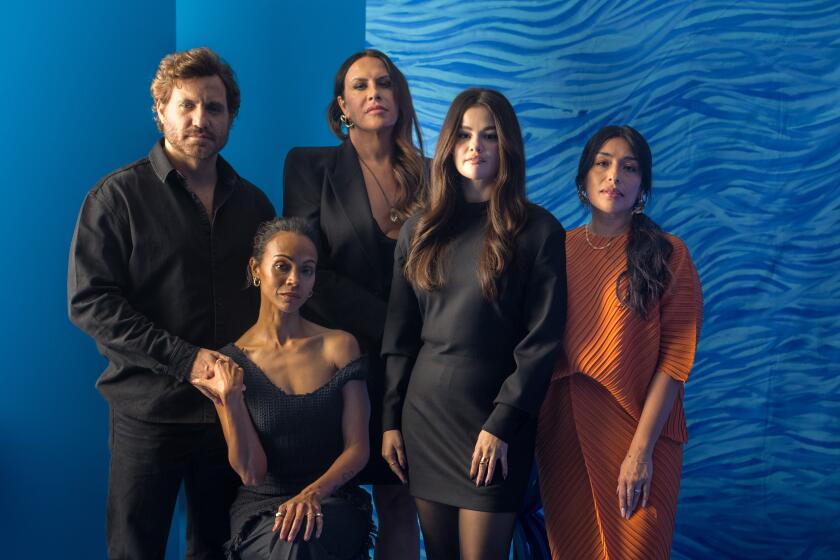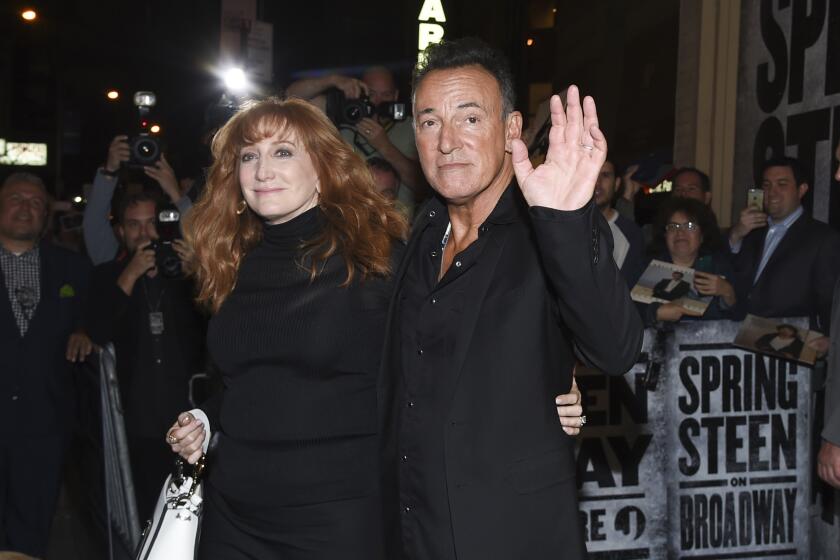Review: The incisive ‘Eat That Question: Frank Zappa in His Own Words’ gives the iconic rocker the stage
Not to put too fine a point on it, but Frank Zappa, the fiercely idiosyncratic musician and composer, hated being interviewed. “It’s one of the most abnormal things you can do to anyone, two steps removed from the Inquisition,” he once said with typical brio, adding, “I don’t think anyone has ever seen the real Frank Zappa.”
Given that, the question is how did director Thorsten Schütte, a veteran German documentarian, turn “Eat That Question: Frank Zappa in His Own Words” into such an absorbing experience? One key to the film’s involving narrative is that that title turns out to be a bit misleading.
Like the recent “Rabin in His Own Words” about the late Israeli prime minister (and wouldn’t that pairing make a wild repertory double bill?), “Eat That Question” contains no third-party testimony, just the subject himself.
But in this film, we hear a good deal from his interrogators, the people sitting down and asking the on-camera questions, and watching the evolution of the different ways journalists interacted with the man tells us a lot about the shifting nature of public perceptions as well as Zappa himself.
Tall, whippet thin, with unruly hair, a formidable mustache and a Mephistophelian air, Zappa (who died of prostate cancer in 1993 at age 52) must have been an intimidating person to talk to. Not only didn’t he suffer fools gladly but he also gave the impression of not suffering anyone at all.
Plus, there was his music. Initially, all anyone talked to Zappa about was the rock repertory he performed with the Mothers of Invention, songs that often featured biting social criticism and lyrics too blistering to play on the radio.
Perhaps, as a result, journalists savaged him (“a force of cultural darkness,” said Time Magazine), and unnerved interviewers inevitably gave him a hard time in the nicest possible way, with one man insisting (really) that the musician had somehow betrayed the ideals of the hippie movement because of his musical success.
“I was always a freak, never a hippie,” Zappa said in reply, and that answer was typical of his unflappability, no matter what was thrown at him.
With sarcasm never far from his lips, Zappa took on fans who liked only his earlier albums (“I hate to see anyone with a closed mind on any subject”) and what he saw as America’s cultural lassitude (“We are culturally nothing, we are only interested in the bottom line.”) He even verbally crossed swords with Florida Sen. Paula Hawkins on the subject of warning labels for record lyrics. (Not surprisingly, he was against them.)
Director Schütte worked for eight years on this project, which was made in association with the Zappa Family Trust and dedicated to Zappa’s widow, Gail, who died last year.
Much of that time was spent tracking down all manner of filmed material, which the director describes as “sniffing out Zappa truffles.” Among the unexpected items are a clip of a short-haired 22-year-old Zappa playing “Concerto for Two Bicycles” with a bemused Steve Allen and a quite serious interview with a uniformed Pennsylvania state trooper.
Along the way, we learn some things that may be surprising. For instance, that Zappa was not a fan of drug use, that he turned down an opportunity to play for Pope Paul VI for a rock festival to be called Popestock and that he considered himself a regular guy with “four kids and a mortgage and all that crap.”
“In His Own Words” does have some small irritations. Zappa’s interviewers are rarely identified, the passage of time is acknowledged only by the graying of Zappa’s sideburns, and though there is a lot of his music in the film, the documentary does not help you with the song titles.
Though Zappa remained resolutely himself from start to finish, journalists became increasingly aware of other aspects of his musical personality, the avant-garde classical material he’d written since high school, music that was treated with great respect in Europe.
As a result, Zappa came to be treated as a beloved cult figure, not a pariah, and some of the most moving material in “Eat That Question” comes near the end when Czech TV shows him getting a hero’s welcome during a 1990 state visit to President Václav Havel.
“Eat That Question’s” final interview is with “Today’s” Jamie Gangel, talking to a visibly ill Zappa just a few months before he died. Irascible to the end, he told her that he was “totally unrepentant,” and said that being remembered was “not important.” If this labor-of-love portrait is any indication, forgetting Frank Zappa is not going to happen any time soon.
====
‘Eat That Question: Frank Zappa in His Own Words’
MPAA rating: R for language, some sexual references and brief nudity
Running time: 1 hour, 30 minutes. Playing Landmark’s Nuart, West Los Angeles
More to Read
Only good movies
Get the Indie Focus newsletter, Mark Olsen's weekly guide to the world of cinema.
You may occasionally receive promotional content from the Los Angeles Times.










